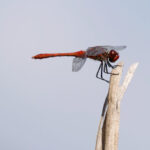Fruit flies are a common nuisance in homes, especially when there’s ripe or decaying fruit around. These tiny insects can quickly become a bother, buzzing around kitchens and fruit bowls. One question that often arises when dealing with these pests is: do fruit flies bite? Let’s delve into the world of fruit flies to understand their nature and address this common concern.
What are Fruit Flies?
Scientifically known as Drosophila melanogaster, fruit flies are aptly named, with “drosophila” meaning “lover of dew,” highlighting their need for moisture to survive. These insects are small, typically about 0.12 inches long and 0.08 inches wide, showcasing a miniature version of the classic fly body structure.
Adult fruit flies are characterized by their tan to black-brown bodies and rounded heads. They possess small antennae, three simple eyes (ocelli), and prominent compound eyes that are usually red, giving them a distinctive appearance. Like other flies, they have a single pair of wings originating from their mid-section.
It’s easy to confuse fruit flies with gnats, as both are small flying insects. However, gnats are generally darker, often black, and have thinner bodies compared to the more robust fruit fly.
Fruit flies are primarily attracted to fruits, which serve as their food source throughout their life cycle. Adults consume rotting plants and fruits, while newly hatched larvae rely solely on the food source where they were laid. This dietary preference is a key reason why they are frequently found in homes, especially kitchens, and are considered common household pests.
Do Fruit Flies Bite Humans?
The straightforward answer to whether fruit flies bite is no, fruit flies do not bite humans in the way mosquitoes or fleas do. They lack the mouthparts necessary to pierce human skin and draw blood. Fruit flies are equipped with sponging mouthparts, designed to lap up liquids and soft foods, which is perfectly suited for their diet of decaying fruit and other organic matter.
While you might feel a slight tickle or annoyance when a fruit fly lands on your skin, this is not a bite. It’s simply the insect walking on you, exploring for potential food sources, although human skin is not something they are interested in consuming. Their small size and delicate mouthparts are simply not capable of biting or piercing human skin.
Are Fruit Flies Harmful in Other Ways?
Although fruit flies are not biting insects and pose no direct harm through bites, they are still considered pests due to other reasons. The primary concern with fruit flies is their ability to contaminate food. They are attracted to decaying organic matter, which can harbor bacteria and yeast. As they move from these unsanitary environments to your fruits and kitchen surfaces, they can transfer these microorganisms.
While fruit flies are not known to transmit diseases to humans, their presence can be unhygienic. They can spread bacteria and potentially cause food spoilage. For individuals with allergies, fruit flies might indirectly contribute to allergic reactions simply through their presence in the home, although this is not a common or well-documented issue. The main issue remains their nuisance factor and potential to contaminate food.
Where Do Fruit Flies Come From and Why Are They Attracted to Your Home?
Fruit flies originated in tropical regions but have spread globally, excluding Antarctica, largely due to human activities. They thrive in temperate climates with readily available water sources. In colder periods, they seek refuge indoors, particularly in areas where food is stored.
The presence of fruit flies in homes is almost always linked to accessible food sources. They are strongly drawn to overripe, rotting, and fermenting fruits and vegetables. Besides fruit, they are also attracted to:
- Wine
- Beer
- Vinegar
- Fruit juices
Interestingly, fruit flies are known to lay eggs even on unripe fruit. This strategy ensures that the food source will last until their eggs hatch and the larvae emerge, guaranteeing a food supply for their offspring. This reproductive behavior contributes to their rapid population growth in homes where food is readily available.
Conclusion
In summary, while fruit flies can be a significant annoyance in homes, especially kitchens, the worry of being bitten by them is unfounded. Fruit flies do not bite humans. They are equipped with mouthparts designed for consuming liquids and soft, decaying matter, not for piercing skin. The real issue with fruit flies is their potential to contaminate food and their nuisance presence. Understanding their attraction to ripe and rotting produce is key to controlling and preventing infestations in your home. By properly storing fruits and vegetables, cleaning up spills promptly, and managing waste, you can significantly reduce the likelihood of fruit flies becoming a problem in your living space.
